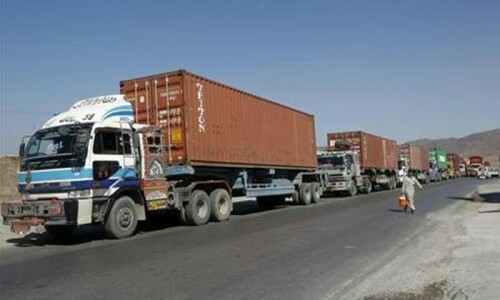KARACHI: The announcement regarding the upcoming elections in Iran, slated to take place in May, did not yield much response in Lyari. It rarely does these days, say residents, as the event is usually of interest only to those who actually participate in it.
Almost four years ago, however, Hassan Rouhani’s nomination and subsequent victory in the presidential elections of 2013 elicited a huge response from many of the area’s Iranian-Baloch residents. Discussions amongst them, a community whose strength remains unconfirmed and based only on guesstimates, were many. These discussions revolved around hailing a “progressive reformer” who replaced a “feisty orator”. International sanctions and the hope of them being lifted made many of them look forward to trade and business.
For most of the Sunni-Baloch on this side of the border, the elections are mostly a way to “fulfil an obligation” or to participate “for the sake of it”. Abdus Samad Rahmani, a 67-year-old shopkeeper I meet for an interview at his store on Lyari’s Kumharwara Road, casts his vote with this thought in mind. In 1945, Rahmani’s grandfather left Sarbaz county in Sistan-Baluchestan for Karachi. Settling in Kalakot, he left behind a medical store which was sold by his sons and shifted to Kumharwara Road. As the owner of the shop now, Rahmani says he has voted for four Iranian presidents. “Right from Akbar Hashemi Rafsanjani, Mahmoud Ahmedinejad to Hassan Rouhani, I voted for all the presidents. The fanfare surrounding elections in the 1980s has been replaced with maintaining a low profile now. I don’t know why this happened. But somehow everyone thought keeping mum about participating in the elections would protect them,” he says. Staying silent for a few moments, he then reaches to his pocket to show his Iranian identity card known, as the Shanas Nameh. “This is what my father left behind for me,” he adds. “I have kept it. I take this with me while going to the consulate to cast my vote,” he adds.
Walking out, he points towards a goods shop right across the busy street. The Sardasht Sarbaz Goods Shop is the only godown left on Kumharwara Road. Most of the goods shops, according to Rahmani, have shifted to the city’s outskirts. “At one point in the 1970s, transport to and from Iran used to operate from Lyari,” he explains. “Because of the constant rush of buses going almost every week from Karachi to Gwadar or from Karachi to Mund [on the Pakistan border, near Turbat] to Iran, there was an equal number of general stores selling exported goods which traders brought from there.”
Back then, the Lighthouse area near Lyari sold clothes and rice exported from Iran. The exported goods from Iran which included rice, lint, soap, shampoo, dried fruit, oil, and sweets then made their way to the north of the country towards Punjab and what is now Khyber Pakhtunkhwa. “Back in the 1970s, transporters used to send some of their buses to drop and bring back voters from the consulate. Now, we either wait for the consulate to arrange transport or go on our own and get back to work,” says Rahmani, moving towards a female customer waiting near the counter.
As the woman leaves, Rahmani begins from where he left off. “There is a widely held perception among the Iranian-Baloch living on this side of the border that their vote doesn’t matter much in the larger scheme of Iranian politics today. This perception is also borne out by the fact that there is a lot of strictness on the Pak-Iran border now. Getting Iranian nationality is not as smooth a process as it used to be. What I have just said is on everyone’s mind, but not many would reveal it,” he adds, finally pulling up a chair and sitting down.
This was proved right, as one after another, three families who had earlier agreed to be interviewed backed off without citing any reason.
A spokesperson with the Iranian consulate, when asked about the upcoming elections and the impact of an Iranian-Baloch vote, says: “The Iranian-Baloch community, wherever it lives, inside or outside of Iran, are respectable and trustworthy people and their enthusiastic participation in elections has been very encouraging for us. Like all other Iranian communities, they too are very valuable for the Iranian authorities and all Iranian centres, particularly the diplomatic missions of the Islamic Republic of Iran based in Pakistan, are in good contact with the Iranians living here.”
For Maula Buksh, Iran is where he is going to move next. “We moved to Nawa Lane in the 1970s.,” he says. “My father, Ali Mohammad, worked hard to get nationalities for my two sisters, my brother and I. Three other siblings could not get it and so moved to Bahrain. Personally, I do participate in the Iranian elections and the Pakistani elections as well. I fear being touted a spy and being arrested in a fake case. That’s why I don’t share the fact that I participate in the elections. I know that there are around 50 families in Lyari that have some link with Iran. But no one will say it openly due to the fear of being categorised.”
Published in Dawn, April 4th, 2017
















































